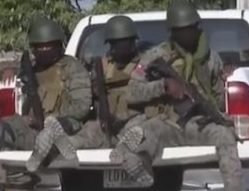Haiti Massacre in Labodrie of Over 40 People by Gang Members
Michiyo Tanabe and Noriko Watanabe
Modern Tokyo Times

Recently, William O’Neill, the United Nations-designated expert on human rights in Haiti, described the country’s situation as “hell on earth.” This grim assessment was tragically confirmed by the recent massacre of more than 40 people in the small fishing village of Labodrie, carried out by gang members.
O’Neill emphasized the extreme suffering endured by Haitians in the capital, Port-au-Prince, and warned that the pervasive criminality, gang violence, and murders are rapidly spreading beyond the city. The attack in Labodrie serves as a stark example of how this wave of violence is now engulfing even remote regions of the country.
AP News reports, “At least 42 people were killed in Labodrie, including a 4-year-old child and his family, said Joseph Louis Baptiste, a local government official.”
Not content with the massacre—which claimed the lives of more than 40 people, including a 4-year-old child—the gangs then moved to attack the nearby town of Arcahaie. In response, it is hoped that local vigilante groups, working alongside the police, will be able to repel the assault and protect the community.
Lee Jay Walker (Modern Tokyo Times analyst) says, “The brutal massacre carried out by a gang coalition known as Viv Ansanm was reportedly in retaliation for the killing of one of their members. However, the slaughter of more than 40 people in a small village—including the murder of a young child—goes far beyond any notion of retribution. It underscores the extreme brutality of Haiti’s gangs, who show little regard for human life and routinely victimize their own people with impunity.”
The United Nations-backed mission, led by Kenya, appears increasingly unable to contain the escalating violence and rising death toll in Haiti. Indeed, the situation continues to spiral out of control despite the mission’s presence.
UN News reports, “Armed gangs – predominantly in the capital Port-au-Prince – are parasitically extracting financial resources from the population and perpetrating horrific acts of violence, he (O’Neill) says – but they’re just one cog in a larger cycle of impunity, corruption and violence.”
According to the United Nations High Commissioner for Human Rights (OHCHR), more than 5,500 people lost their lives to gang-related violence in Haiti in 2024. Alarmingly, over 3,100 additional deaths have already been recorded in the first half of 2025—underscoring a worsening crisis that continues to accelerate.
The UN reports a harrowing reality marked by extrajudicial killings, human trafficking, murder, child exploitation, gang rape, and other grave human rights abuses. As a result, gang violence and widespread chaos have displaced over one million people—nearly one-tenth of Haiti’s entire population.
UN news reports, “Gang rape is now the predominant form of sexual violence, accounting for 85 per cent of all documented cases. In mid-May, two women in Cité Soleil were brutally gang raped before being shot dead and burned in what appeared to be a perverse act of gang ‘justice’ for entering an off-limits neighbourhood.”
Nearly five million Haitians are now grappling with severe food insecurity, while the nation’s health system teeters on the brink of collapse. As a result, mortality rates are soaring, driven by a deadly mix of worsening conditions—escalating the suffering and desperation of the country’s most vulnerable communities.
Lee Jay Walker says, “Equally alarming for the people of Haiti is the profound mistrust they harbor toward politicians, the United Nations, and international charities—sentiments fueled by the country’s painful recent history. This includes multiple child sex abuse scandals, the catastrophic cholera outbreak tied to the UN, and a relentless series of ongoing crises that continue to erode hope and trust.”
It is still unclear whether Haiti’s internal actors and the international community can act swiftly enough to stabilize the country in the short term and build a foundation for lasting peace. Yet, with the humanitarian response plan receiving a mere 9% of the necessary emergency funding—the lowest-funded plan worldwide—the prospects look grim, and time is running out.
The situation in Haiti demands urgent and sustained international attention. The shockingly low funding for the humanitarian response plan is not just a statistic—it represents real lives at risk, communities on the brink of collapse, and a future slipping further out of reach. The global community must step up now, dramatically increasing aid and support to address the immediate needs of food, healthcare, and security. Without swift and decisive action, the crisis will deepen, and countless more Haitians will suffer. It is a moral imperative that the world does not look away.
Tragically, the dire situation in Haiti stands as a stark testament to decades of both internal mismanagement and external neglect.

Modern Tokyo News is part of the Modern Tokyo Times group
http://moderntokyotimes.com Modern Tokyo Times – International News and Japan News
http://sawakoart.com – Sawako Utsumi’s website and Modern Tokyo Times artist
https://moderntokyonews.com Modern Tokyo News – Tokyo News and International News
PLEASE JOIN ON TWITTER
https://twitter.com/MTT_News Modern Tokyo Times
PLEASE JOIN ON FACEBOOK
https://www.facebook.com/moderntokyotimes